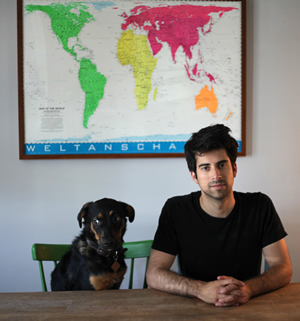|
I'm an awful dancer. Springy. Sort of mud-footed feels accurate to say. Nothing finds its way out of my head as planned. It's something I think about a surprising amount, a daily limitation glued over me, especially since I'd lose sight before I'd sacrifice the ability to listen to music. However, plain and simple, on the day-to-day, I am entirely rhythmless.
I grew up in Ohio, and while my town wasn't Footloosean, dancing was never in the foreground: not at family parties, little at school dances, and as normed Midwesterners, our high school parties were confined to basements and bonfires. When I showed up at college, dancing was much more prevalent, but not exactly overflowing with talent, and largely alcohol-driven; the previous night's performance never scored, if long remembered.
All this time, no one in my life was asking me to dance, either. No one was interested in whether or not I could keep a beat, follow a step, expand my athleticism.
However, moving to different cities, I learned how physical expressiveness was actually necessary to many people's daily lives, either ingrained from an early age, or always encouraged for its freeness, for the relief that pours over you while dancing. Somehow, everyone wanted to go dancing, and everyone needed to go dancing, and I became that tag-along kid trying really hard to go unseen.
At times, I would go, a combination lock of frustration and desire, and join in the best I was able, always something to drink nearby, but the exposure I felt, the insecurity I had in those rooms, can still resurface and make me light-headed. What was often worse, those who can dance are always quick to dismiss those non-dancers, forcing their limbs into the open, or implying that dancing comes from listening to the song, and letting your body follow along: watch me, do what I do, it's so easy.
And us non-dancers always try to appease the situation, to lean in, because, the truth is, we want to dance. God, do we want to dance more than anything, so that the sporadic motions that emerge are a recurring daydream that our bodies will fall into place, will be able to mimic everyone else—to feel invulnerable with our legs and waist for just a song.
For many years, I've used writer interviews and stories to guide the way I write. A long process of development, where I adopted the direction and styles of those I admired most, always to be warned otherwise by the same needling words of advice: watch me, find your voice, it's so easy. Unfortunately, what was never navigable was the appreciation of my own voice. It's hard to not favor your thoughts as expressed by someone else.
It was three years into writing short stories without much guidance that this role of voice finally unlocked for me. I was reading Taiye Selasi's Ghana Must Go, and somewhere in the opening chapters, she uses the phrase “easy peasy.” Easy peasy. How could something so smart contain such a passingly goofy phrase? But in the context of her voice, it felt entirely natural, nothing lost. It was Selasi dancing out the story, and the rest of that excellent novel is steeped in this same energetic language.
Whatever the case, so many of the books and stories I'd read in previous years that were heavily voice-driven didn't clarify this message, didn't invite any safety for me to dance around with, because their steps seemed so well-tuned, so confident in where they were headed.
Voice, however, is something that can't be contained by definition, or forced out by someone else's gravity. It's the spectrum of who we are down to the nuances and lyrics of our thoughts. It is quite earnestly how you dance brought onto the page. So my taxicab confession: I now dance all the time on my own. No one knows this, no one is likely to see, but nearly every day, in some small steps to retrieve the mail, a move between rooms, I am absolutely dancing, without hang-up or terror. Those minute-long reprieves are a recharge, a reminder to keep excavating my voice in order to deliver what it is I'm longing to convey, to lessen and humble myself, because, honestly, I'm still an awful dancer. (I think I'm getting worse.) Only, now I see what is so necessary for so many, now I have my mudprints all over the page.
If you can't dance in front of other people, I get it, but you have to learn to dance for yourself, to dance in your own voice enough to figure out what you're trying to say. And the next time you're in a crowd not keeping up, and feel the voices of others trying to prod you along—fuck 'em. Your voice is held by no one. Stick it out, head home, and, once there, dance until everything around you breaks apart.
|


